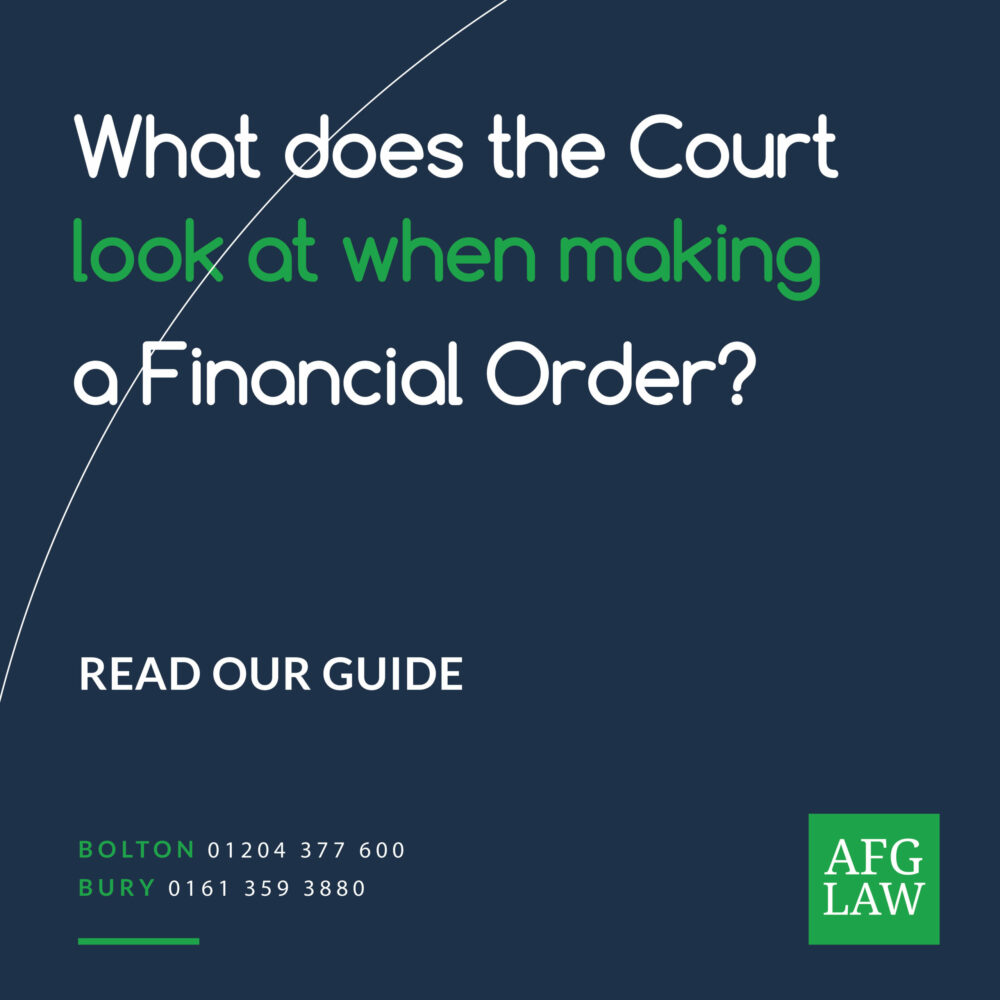- BOLTON 01204 377600
- BURY 0161 359 3880

Friday July 1, 2022
We understand that most people haven’t been through the divorce process before and that getting a divorce and a financial settlement can be stressful and confusing. Our financial settlement solicitors will guide you through the process and support you to ensure you achieve the best possible outcome. There are different ways to try and reach a financial settlement but whether you are trying to negotiate a financial settlement, attending mediation or making an application to court the same specific criteria will be considered.
The starting point is the checklist set out in s25 of the Matrimonial Causes Act 1973 and the equivalent provisions in Schedule 5, Part 5 to the Civil Partnership Act 2004. These are often called the section 25 factors. The factors are all given the same weight; none of the factors are more important than another. However, once they have been considered the Financial Remedies Court will also consider ‘needs’ both of any children of the family and the divorcing couple. The ‘needs’ and welfare of any children then take precedence in determining how the marital assets are to be divided.
s25 says that the matters to which the court is to have regard in deciding how to exercise its powers are as follows:
(1) It shall be the duty of the court in deciding whether to exercise its powers and if so in what manner to have regard to all the circumstances of the case, first consideration being given to the welfare while a minor of any child of the family who has not attained the age of 18
(2) As regards the exercise of the powers of the court in relation to a party to the marriage the court shall in particular have regard to the following matters
(a) The income, earning capacity, property and other financial resources which each of the parties to the marriage has or is likely to have in the foreseeable future, including in the case of earning capacity any increase in that capacity which it would in the opinion of the court be reasonable to expect a party to the marriage to take steps to acquire;
(b) the financial needs, obligations and responsibilities which each of the parties to the marriage has or is likely to have in the foreseeable future;
(c) the standard of living enjoyed by the family before the breakdown of the marriage;
(d) the age of each party to the marriage and the duration of the marriage;
(e) any physical or mental disability of either of the parties to the marriage;
(f) the contributions which each of the parties has made or is likely in the foreseeable future to make to the welfare of the family, including any contribution by looking after the home or caring for the family;
(g) the conduct of each of the parties, if that conduct is such that it would in the opinion of the court the inequitable to disregard it;
(h) in the case of proceedings for divorce on nullity of marriage value to each of the parties to the marriage of any benefit which by reason of the dissolution or annulment of the marriage that party will lose the chance of acquiring
(3) As regards the exercise of the powers of the court in relation to a child of the family, the court shall in particular have regard to the following matters –
(a) the financial needs of the child;
(b) the income, earning capacity (if any), Property and other financial resources of the child;
(c) any physical or mental disability of the child;
(d) the manner in which he was being and in which the parties to the marriage expected him to be educated or trained;
(e) the considerations mentioned in relation to the parties to the marriage in paragraphs ABC and E above
If a child is a child of the family but not a child of a party that the court is being asked to make an order against the court shall also have regard –
(a) to whether that party assumed any responsibility for the child maintenance and, if so, to the extent to which, and the basis upon which, that party assumes such responsibility and to the length of time for which that party discharge to such responsibility;
(b) to whether in assuming and discharging such Responsibility that party did so knowing that the child was not his or her own;
(c) to the liability of any other person to maintain the child
Our family team can help you with a full range of legal services.
Contact familysolicitor@afglaw.co.uk for further information or call us on 01204 377600.
We offer a full range of legal services for individuals and businesses alike.
Many of our services are provided UK-wide, with our physical offices located in Bolton and Bury.